The Second Miaoli International Mask Festival (第二屆苗栗國際假面藝術節), which opened Saturday, is presenting one of the most comprehensive exhibitions of Asian masks ever held in Taiwan. The event, which runs until April 29, will also incorporate an array of folk music and dance performances associated with the use of masks.
The exhibition and performances are sponsored by the Miaoli County Culture Bureau (
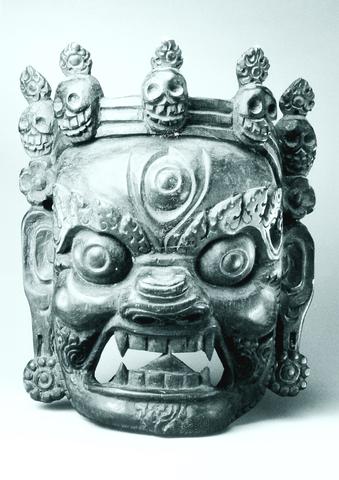
PHOTO COURTESY OF ACEF
The current exhibition, which focuses on Asia, contains 403 masks, many of them over a century old. Highlights of the exhibition are two sacrificial masks from Java which date back 1,000 years, one of which is made of gold, the other of bronze. Securing these objects' shipment to Taiwan for the show was perhaps the event's biggest coup. "Insurance made up a large part of the expenses for this show," said Chou.
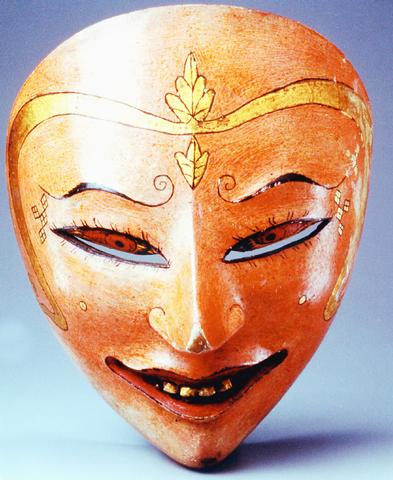
PHOTO COURTESY OF ACEF
The mask exhibition takes the form of an installation art display and aims to cover the two main traditions of mask art in Asia, Chinese and Indian. Chou said said viewers will be able to see the frequent overlap of the traditions,especially visible in the mask art of regions like Tibet. Featured masks originate from Mongolia, Tibet, China, Japan, Taiwan, Thailand, India, Nepal and Sri Lanka.
The Miaoli Mask Festival was initiated in 1999 during the preparation for the construction of the Sanyi Museum of Wood Sculpture (三義木雕博物館), when cultural administrators happened upon the strong vein of mask art that exists within Miaoli's wood carving tradition.
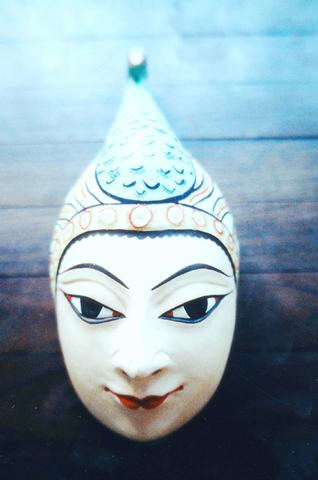
PHOTO COURTESY OF ACEF
The subtitle of the show "Masks, a Banquet for the Soul" (假面的藝術,心靈的饗宴) is intended to emphasize the important role that masks play in expressing religious aspirations and the importance of masks in traditional culture.
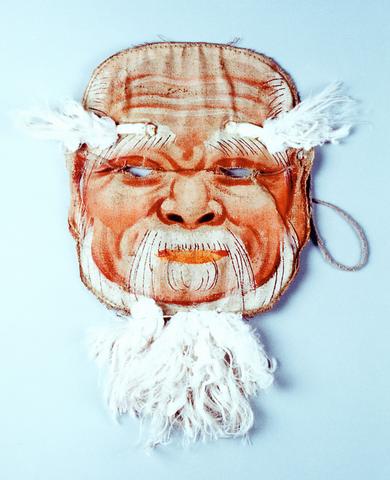
PHOTO COURTESY OF ACEF
Although masks are not commonly used in Chinese ritual or performance, Hakka (客家) culture, which is strongly represented in Miaoli, uses masks in funeral rites, which explains the choice of Miaoli for the event.
Hakka masks will be on display, as will another form of Chinese masks, called "Nuo" (儺面), which date back to the Tang dynasty (618-907) and are currently only used in China's relatively isolated Guizhou (貴州) and Jiangxi (
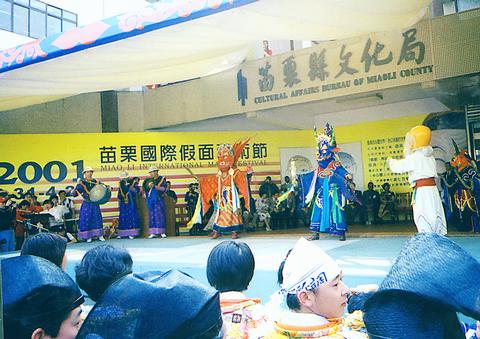
PHOTO: TIFFANY FENG, TAIPEI TIMES
One of the most dynamic elements of the festival will be performances by troupes from all over the world. These will be held in many different locations around Miaoli and most, with the exception of those by higher-profile dance groups, will be free.
Organizers say the event is a rare opportunity to learn about the rich heritage and multiple religious and cultural usages of masks. "By wearing a mask I represent a ghost. In the northeast of Thailand, the masked performers scare away evil spirits that lurk in the wilderness," said one ghost performer of the Nongkhai Dramatic Art Club (農凱戲劇藝術團) from Thailand.
Members of Mongol National Ethnic Dance Group (蒙古國家民族歌舞團) said that their masks were representations of Buddha, and their performance was intended to subdue demons and enhance people's faith in Buddhism.
Fu Hsueh-peng (傅學鵬), Miaoli County commissioner, said he hoped the arts festival would become a regular event to show off Miaoli's culture and give Miaoli residents a chance to learn more about the cultures of other nations.
What: The Second Miaoli International Mask Festival (
When: April 1 to April 29, 9am to 9pm
Where: Miaoli County Culture Bureau (
Ticket: Exhibition NT$100; Performances, free or NT$100 to NT$500
For more information call (037) 352-961 ext. 611-614 or check out the festival Web site at http://www.mask.org.tw.

This month the government ordered a one-year block of Xiaohongshu (小紅書) or Rednote, a Chinese social media platform with more than 3 million users in Taiwan. The government pointed to widespread fraud activity on the platform, along with cybersecurity failures. Officials said that they had reached out to the company and asked it to change. However, they received no response. The pro-China parties, the Chinese Nationalist Party (KMT) and Taiwan People’s Party (TPP), immediately swung into action, denouncing the ban as an attack on free speech. This “free speech” claim was then echoed by the People’s Republic of China (PRC),

Exceptions to the rule are sometimes revealing. For a brief few years, there was an emerging ideological split between the Democratic Progressive Party (DPP) and Chinese Nationalist Party (KMT) that appeared to be pushing the DPP in a direction that would be considered more liberal, and the KMT more conservative. In the previous column, “The KMT-DPP’s bureaucrat-led developmental state” (Dec. 11, page 12), we examined how Taiwan’s democratic system developed, and how both the two main parties largely accepted a similar consensus on how Taiwan should be run domestically and did not split along the left-right lines more familiar in

Specialty sandwiches loaded with the contents of an entire charcuterie board, overflowing with sauces, creams and all manner of creative add-ons, is perhaps one of the biggest global food trends of this year. From London to New York, lines form down the block for mortadella, burrata, pistachio and more stuffed between slices of fresh sourdough, rye or focaccia. To try the trend in Taipei, Munchies Mafia is for sure the spot — could this be the best sandwich in town? Carlos from Spain and Sergio from Mexico opened this spot just seven months ago. The two met working in the

Many people in Taiwan first learned about universal basic income (UBI) — the idea that the government should provide regular, no-strings-attached payments to each citizen — in 2019. While seeking the Democratic nomination for the 2020 US presidential election, Andrew Yang, a politician of Taiwanese descent, said that, if elected, he’d institute a UBI of US$1,000 per month to “get the economic boot off of people’s throats, allowing them to lift their heads up, breathe, and get excited for the future.” His campaign petered out, but the concept of UBI hasn’t gone away. Throughout the industrialized world, there are fears that